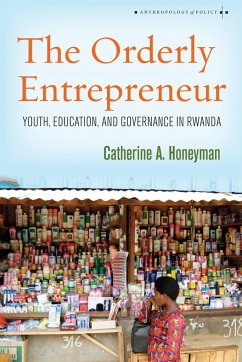- Gebundenes Buch
- Merkliste
- Auf die Merkliste
- Bewerten Bewerten
- Teilen
- Produkt teilen
- Produkterinnerung
- Produkterinnerung
Catherine A. Honeyman is Visiting Scholar at the Duke Center for International Development and Managing Director of Ishya Consulting.
Andere Kunden interessierten sich auch für
![Globalization from the Bottom Up Globalization from the Bottom Up]() A. Coskun SamliGlobalization from the Bottom Up42,99 €
A. Coskun SamliGlobalization from the Bottom Up42,99 €![Constructing Policy Change Constructing Policy Change]() Linda WhiteConstructing Policy Change93,99 €
Linda WhiteConstructing Policy Change93,99 €![The School I Deserve The School I Deserve]() Jo NapolitanoThe School I Deserve24,99 €
Jo NapolitanoThe School I Deserve24,99 €![The Great Equalizer The Great Equalizer]() David SmickThe Great Equalizer25,99 €
David SmickThe Great Equalizer25,99 €![Teacher Professionalism in the Global South Teacher Professionalism in the Global South]() Leon TiklyTeacher Professionalism in the Global South71,99 €
Leon TiklyTeacher Professionalism in the Global South71,99 €![The Luka Legend Lugano The Luka Legend Lugano]() Amani Mupenda MubigaloThe Luka Legend Lugano39,99 €
Amani Mupenda MubigaloThe Luka Legend Lugano39,99 €![THE FUTURE EMPLOYERS AND BILLIONAIRES OF AFRICA. WHO ARE THEY? THE FUTURE EMPLOYERS AND BILLIONAIRES OF AFRICA. WHO ARE THEY?]() Junior MBANGUNA AFAMBINANYITHE FUTURE EMPLOYERS AND BILLIONAIRES OF AFRICA. WHO ARE THEY?43,99 €
Junior MBANGUNA AFAMBINANYITHE FUTURE EMPLOYERS AND BILLIONAIRES OF AFRICA. WHO ARE THEY?43,99 €-
-
-
Catherine A. Honeyman is Visiting Scholar at the Duke Center for International Development and Managing Director of Ishya Consulting.
Hinweis: Dieser Artikel kann nur an eine deutsche Lieferadresse ausgeliefert werden.
Hinweis: Dieser Artikel kann nur an eine deutsche Lieferadresse ausgeliefert werden.
Produktdetails
- Produktdetails
- Verlag: Stanford University Press
- Seitenzahl: 320
- Erscheinungstermin: 14. September 2016
- Englisch
- Abmessung: 231mm x 152mm x 23mm
- Gewicht: 499g
- ISBN-13: 9780804797979
- ISBN-10: 0804797978
- Artikelnr.: 45002774
- Herstellerkennzeichnung
- Libri GmbH
- Europaallee 1
- 36244 Bad Hersfeld
- gpsr@libri.de
- Verlag: Stanford University Press
- Seitenzahl: 320
- Erscheinungstermin: 14. September 2016
- Englisch
- Abmessung: 231mm x 152mm x 23mm
- Gewicht: 499g
- ISBN-13: 9780804797979
- ISBN-10: 0804797978
- Artikelnr.: 45002774
- Herstellerkennzeichnung
- Libri GmbH
- Europaallee 1
- 36244 Bad Hersfeld
- gpsr@libri.de
Catherine A. Honeyman is Visiting Scholar at the Duke Center for International Development and Managing Director of Ishya Consulting.
Contents and Abstracts
1Creativity, Credentials, and Controls
chapter abstract
Chapter 1 frames the international significance of Rwanda's "orderly
entrepreneur", and introduces the main triad of tensions for
post-developmental views of the citizen, in terms of creativity,
credentials, and control. While some Western countries continue to debate
the reasons for a stubbornly persistent economic crisis, Rwanda has already
settled on a strategy for 21st century economic growth that draws on the
recent experiences of a number of East and South-East Asian regimes.
Combining a state-centered "developmental" approach with aspects of
free-market neoliberalism, these countries are pursuing a new form of
governance that is quickly rising to prominence on the global scene. This
chapter also introduces the book's contribution to the theoretical
foundations of the anthropology of policy, outlining a new model of
governance as negotiated social learning. The research timeline, methods,
and approach are also summarized.
2Why Entrepreneurship Education?
chapter abstract
Chapter 2 offers two different accounts of how the Rwandan government
decided to introduce courses on entrepreneurship into its secondary school
curriculum. Expanding what is initially a national policy-making narrative
outward to consider international dynamics of social influence, the chapter
examines the rise of neoliberalism and the ways in which this form of
governmental rationality has profoundly-though not completely-influenced
Rwandan policy-makers. Rwanda's entrepreneurship education policy, it
becomes clear, holds a broader significance for understanding global shifts
in dominant forms of governance. The chapter also presents in greater
detail the theoretical perspective on governance as negotiated social
learning, discussing its foundations in the concepts of governmentality,
social field, habitus, the multiplicity of structures, and communities of
practice.
3Coding Entrepreneurship for O-Level
chapter abstract
Chapter 3 features excerpts from colonial and post-colonial documents about
schooling alongside contemporary Rwandan curriculum developers' first
attempts at creating an entrepreneurship curriculum for O-level (grades
7-9). This exploration shows how education specialists' ingrained
understandings of the purpose of schools transformed the meaning of
entrepreneurship education before it even reached the classroom. Despite
their efforts to write a practical, learner-centered curriculum, following
the ideals of active pedagogy, an unspoken settlement was quickly reached
in which "practical relevance" was reinterpreted to mean codifying
knowledge about entrepreneurship and government regulations in an
examinable form. In the process, the more elusive aspects of the practice
of entrepreneurship-such as creativity, initiative, and independent
problem-solving-were either calcified or set aside.
4Reimagining Entrepreneurship for A-Level
chapter abstract
Focusing on later episodes in the curriculum-development process, Chapter 4
illustrates how mid-process changes in Rwanda's government and educational
institutions led to significant transformations in the social context of
curriculum production. When the development of the A-level (grades 10-12)
entrepreneurship curriculum began, the explicit policy instructions
remained the same. But the context had changed, in three significant ways:
the approach of the national examinations system, the level of exposure to
external texts, and the language of instruction. The resulting O-level and
A-level entrepreneurship curricula exemplified the internal tensions of the
post-developmental state, hanging in the balance between creativity and
controls.
5Chalk and Talk Lessons in Entrepreneurship
chapter abstract
Chapter 5 turns to observations and interviews in five schools where the
new course in entrepreneurship was being taught, focusing on teachers'
decisions to fit lessons about entrepreneurial creativity and government
regulations into a mode of "chalk and talk". By just a few weeks into the
year, these teachers had already defined "creativity" and moved on to other
topics, even as they seemed to spend every day underlining the importance
of examinations and credentials. The chapter discusses the limited power of
curriculum-as a cultural text divorced from its original social conditions
of production-to change teacher practices. A further paradox of the
post-developmental state is also revealed: even while the neoliberal ideals
of self-reliance and initiative require a fundamental change in teacher
pedagogy, the parallel need for a strong-state disciplinary orientation can
only be brought about when teachers maintain their authoritative role.
6Students Question the Course
chapter abstract
Chapter 6 argues that the entrepreneurship course ended up emphasizing
disciplinary values more than neoliberal ones because students, not just
teachers, preferred it that way. A series of vignettes show how students
influence teacher practice through their responses and their silence, as a
result playing their own significant role in shaping the government's
entrepreneurship education policy. The chapter discusses the way in which
teacher practice is mutually constituted with students' reactions of
approval and disapproval, suggesting that students may strategically use
disorderly conduct in service of maintaining the orderly school system they
count on to help them prepare for examinations, for obtaining credentials,
and thus potentially for socio-economic mobility. Finally, the chapter
explores the belief shared by many students, that a course in
entrepreneurship could never be practical-no matter what the pedagogical
approach-unless they are also given capital to implement their ideas.
7The Creative Enterprise of Earning Credentials
chapter abstract
Chapter 7 follows Rwandan secondary school graduates beyond school walls,
describing youth who are "just sitting at home", those who use their social
connections to search for jobs, and the few who have created their own
micro-enterprises. It becomes apparent that most manifestations of youth
entrepreneurship in Rwanda that go beyond mere survival, in fact represent
the means by which students attain an education, rather than its result.
Ultimately, the chapter shows how disadvantaged students regard school
credentials as an essential prerequisite for attaining the higher social,
cultural, and economic capital that would enable them to move from a
subsistence level of forced self-employment, to a level at which they could
become high-earning entrepreneurs by choice.
8We Will Help the State, but Will the State Help Us?
chapter abstract
Chapter 8 turns more directly to the implications of post-developmental
state policies for the next generation of Rwandan youth who hope to move
from mere survival to a life of some status and stability. Even as the
Rwandan government promotes business activity, the overall regulatory
regime is being extended deep into daily life. As graduates struggle to
comply with these rules, many have begun to wish for the right to do
business in a disorderly fashion-at least until they can set aside enough
money to create something more stable and formalized. They argued that if
the government is not going to act as their patron-by providing them
directly with jobs, or with the capital they need to start their
businesses-then it should at least fulfill the role of a partner by
guaranteeing the conditions that would allow them to start their businesses
with limited means.
Conclusion: The Orderly Entrepreneur in Rwanda and Beyond
chapter abstract
This chapter summarizes the main findings of the research for a general
audience, and discusses the significance of Rwanda's entrepreneurship
policies in the context of a shifting international landscape of political,
intellectual, and economic power. The chapter reviews the four scenes
explored in the book-the national and international policy context that is
today shaping a post-developmental style of governance in Rwanda, the
offices and meeting rooms of Rwanda's National Curriculum Development
Center, the classrooms of Rwanda's secondary schools, and Rwandan
graduates' lives beyond school walls-and makes practical policy-relevant
recommendations in relation to each one. It also summarizes the theoretical
contributions that the book makes to the anthropology of policy by
examining governance as a process of negotiated social learning. Finally,
the chapter cautions governments experimenting with post-developmental
strategies about the need to pay particular attention to the effects of
their policies on the most disadvantaged.
1Creativity, Credentials, and Controls
chapter abstract
Chapter 1 frames the international significance of Rwanda's "orderly
entrepreneur", and introduces the main triad of tensions for
post-developmental views of the citizen, in terms of creativity,
credentials, and control. While some Western countries continue to debate
the reasons for a stubbornly persistent economic crisis, Rwanda has already
settled on a strategy for 21st century economic growth that draws on the
recent experiences of a number of East and South-East Asian regimes.
Combining a state-centered "developmental" approach with aspects of
free-market neoliberalism, these countries are pursuing a new form of
governance that is quickly rising to prominence on the global scene. This
chapter also introduces the book's contribution to the theoretical
foundations of the anthropology of policy, outlining a new model of
governance as negotiated social learning. The research timeline, methods,
and approach are also summarized.
2Why Entrepreneurship Education?
chapter abstract
Chapter 2 offers two different accounts of how the Rwandan government
decided to introduce courses on entrepreneurship into its secondary school
curriculum. Expanding what is initially a national policy-making narrative
outward to consider international dynamics of social influence, the chapter
examines the rise of neoliberalism and the ways in which this form of
governmental rationality has profoundly-though not completely-influenced
Rwandan policy-makers. Rwanda's entrepreneurship education policy, it
becomes clear, holds a broader significance for understanding global shifts
in dominant forms of governance. The chapter also presents in greater
detail the theoretical perspective on governance as negotiated social
learning, discussing its foundations in the concepts of governmentality,
social field, habitus, the multiplicity of structures, and communities of
practice.
3Coding Entrepreneurship for O-Level
chapter abstract
Chapter 3 features excerpts from colonial and post-colonial documents about
schooling alongside contemporary Rwandan curriculum developers' first
attempts at creating an entrepreneurship curriculum for O-level (grades
7-9). This exploration shows how education specialists' ingrained
understandings of the purpose of schools transformed the meaning of
entrepreneurship education before it even reached the classroom. Despite
their efforts to write a practical, learner-centered curriculum, following
the ideals of active pedagogy, an unspoken settlement was quickly reached
in which "practical relevance" was reinterpreted to mean codifying
knowledge about entrepreneurship and government regulations in an
examinable form. In the process, the more elusive aspects of the practice
of entrepreneurship-such as creativity, initiative, and independent
problem-solving-were either calcified or set aside.
4Reimagining Entrepreneurship for A-Level
chapter abstract
Focusing on later episodes in the curriculum-development process, Chapter 4
illustrates how mid-process changes in Rwanda's government and educational
institutions led to significant transformations in the social context of
curriculum production. When the development of the A-level (grades 10-12)
entrepreneurship curriculum began, the explicit policy instructions
remained the same. But the context had changed, in three significant ways:
the approach of the national examinations system, the level of exposure to
external texts, and the language of instruction. The resulting O-level and
A-level entrepreneurship curricula exemplified the internal tensions of the
post-developmental state, hanging in the balance between creativity and
controls.
5Chalk and Talk Lessons in Entrepreneurship
chapter abstract
Chapter 5 turns to observations and interviews in five schools where the
new course in entrepreneurship was being taught, focusing on teachers'
decisions to fit lessons about entrepreneurial creativity and government
regulations into a mode of "chalk and talk". By just a few weeks into the
year, these teachers had already defined "creativity" and moved on to other
topics, even as they seemed to spend every day underlining the importance
of examinations and credentials. The chapter discusses the limited power of
curriculum-as a cultural text divorced from its original social conditions
of production-to change teacher practices. A further paradox of the
post-developmental state is also revealed: even while the neoliberal ideals
of self-reliance and initiative require a fundamental change in teacher
pedagogy, the parallel need for a strong-state disciplinary orientation can
only be brought about when teachers maintain their authoritative role.
6Students Question the Course
chapter abstract
Chapter 6 argues that the entrepreneurship course ended up emphasizing
disciplinary values more than neoliberal ones because students, not just
teachers, preferred it that way. A series of vignettes show how students
influence teacher practice through their responses and their silence, as a
result playing their own significant role in shaping the government's
entrepreneurship education policy. The chapter discusses the way in which
teacher practice is mutually constituted with students' reactions of
approval and disapproval, suggesting that students may strategically use
disorderly conduct in service of maintaining the orderly school system they
count on to help them prepare for examinations, for obtaining credentials,
and thus potentially for socio-economic mobility. Finally, the chapter
explores the belief shared by many students, that a course in
entrepreneurship could never be practical-no matter what the pedagogical
approach-unless they are also given capital to implement their ideas.
7The Creative Enterprise of Earning Credentials
chapter abstract
Chapter 7 follows Rwandan secondary school graduates beyond school walls,
describing youth who are "just sitting at home", those who use their social
connections to search for jobs, and the few who have created their own
micro-enterprises. It becomes apparent that most manifestations of youth
entrepreneurship in Rwanda that go beyond mere survival, in fact represent
the means by which students attain an education, rather than its result.
Ultimately, the chapter shows how disadvantaged students regard school
credentials as an essential prerequisite for attaining the higher social,
cultural, and economic capital that would enable them to move from a
subsistence level of forced self-employment, to a level at which they could
become high-earning entrepreneurs by choice.
8We Will Help the State, but Will the State Help Us?
chapter abstract
Chapter 8 turns more directly to the implications of post-developmental
state policies for the next generation of Rwandan youth who hope to move
from mere survival to a life of some status and stability. Even as the
Rwandan government promotes business activity, the overall regulatory
regime is being extended deep into daily life. As graduates struggle to
comply with these rules, many have begun to wish for the right to do
business in a disorderly fashion-at least until they can set aside enough
money to create something more stable and formalized. They argued that if
the government is not going to act as their patron-by providing them
directly with jobs, or with the capital they need to start their
businesses-then it should at least fulfill the role of a partner by
guaranteeing the conditions that would allow them to start their businesses
with limited means.
Conclusion: The Orderly Entrepreneur in Rwanda and Beyond
chapter abstract
This chapter summarizes the main findings of the research for a general
audience, and discusses the significance of Rwanda's entrepreneurship
policies in the context of a shifting international landscape of political,
intellectual, and economic power. The chapter reviews the four scenes
explored in the book-the national and international policy context that is
today shaping a post-developmental style of governance in Rwanda, the
offices and meeting rooms of Rwanda's National Curriculum Development
Center, the classrooms of Rwanda's secondary schools, and Rwandan
graduates' lives beyond school walls-and makes practical policy-relevant
recommendations in relation to each one. It also summarizes the theoretical
contributions that the book makes to the anthropology of policy by
examining governance as a process of negotiated social learning. Finally,
the chapter cautions governments experimenting with post-developmental
strategies about the need to pay particular attention to the effects of
their policies on the most disadvantaged.
Contents and Abstracts
1Creativity, Credentials, and Controls
chapter abstract
Chapter 1 frames the international significance of Rwanda's "orderly
entrepreneur", and introduces the main triad of tensions for
post-developmental views of the citizen, in terms of creativity,
credentials, and control. While some Western countries continue to debate
the reasons for a stubbornly persistent economic crisis, Rwanda has already
settled on a strategy for 21st century economic growth that draws on the
recent experiences of a number of East and South-East Asian regimes.
Combining a state-centered "developmental" approach with aspects of
free-market neoliberalism, these countries are pursuing a new form of
governance that is quickly rising to prominence on the global scene. This
chapter also introduces the book's contribution to the theoretical
foundations of the anthropology of policy, outlining a new model of
governance as negotiated social learning. The research timeline, methods,
and approach are also summarized.
2Why Entrepreneurship Education?
chapter abstract
Chapter 2 offers two different accounts of how the Rwandan government
decided to introduce courses on entrepreneurship into its secondary school
curriculum. Expanding what is initially a national policy-making narrative
outward to consider international dynamics of social influence, the chapter
examines the rise of neoliberalism and the ways in which this form of
governmental rationality has profoundly-though not completely-influenced
Rwandan policy-makers. Rwanda's entrepreneurship education policy, it
becomes clear, holds a broader significance for understanding global shifts
in dominant forms of governance. The chapter also presents in greater
detail the theoretical perspective on governance as negotiated social
learning, discussing its foundations in the concepts of governmentality,
social field, habitus, the multiplicity of structures, and communities of
practice.
3Coding Entrepreneurship for O-Level
chapter abstract
Chapter 3 features excerpts from colonial and post-colonial documents about
schooling alongside contemporary Rwandan curriculum developers' first
attempts at creating an entrepreneurship curriculum for O-level (grades
7-9). This exploration shows how education specialists' ingrained
understandings of the purpose of schools transformed the meaning of
entrepreneurship education before it even reached the classroom. Despite
their efforts to write a practical, learner-centered curriculum, following
the ideals of active pedagogy, an unspoken settlement was quickly reached
in which "practical relevance" was reinterpreted to mean codifying
knowledge about entrepreneurship and government regulations in an
examinable form. In the process, the more elusive aspects of the practice
of entrepreneurship-such as creativity, initiative, and independent
problem-solving-were either calcified or set aside.
4Reimagining Entrepreneurship for A-Level
chapter abstract
Focusing on later episodes in the curriculum-development process, Chapter 4
illustrates how mid-process changes in Rwanda's government and educational
institutions led to significant transformations in the social context of
curriculum production. When the development of the A-level (grades 10-12)
entrepreneurship curriculum began, the explicit policy instructions
remained the same. But the context had changed, in three significant ways:
the approach of the national examinations system, the level of exposure to
external texts, and the language of instruction. The resulting O-level and
A-level entrepreneurship curricula exemplified the internal tensions of the
post-developmental state, hanging in the balance between creativity and
controls.
5Chalk and Talk Lessons in Entrepreneurship
chapter abstract
Chapter 5 turns to observations and interviews in five schools where the
new course in entrepreneurship was being taught, focusing on teachers'
decisions to fit lessons about entrepreneurial creativity and government
regulations into a mode of "chalk and talk". By just a few weeks into the
year, these teachers had already defined "creativity" and moved on to other
topics, even as they seemed to spend every day underlining the importance
of examinations and credentials. The chapter discusses the limited power of
curriculum-as a cultural text divorced from its original social conditions
of production-to change teacher practices. A further paradox of the
post-developmental state is also revealed: even while the neoliberal ideals
of self-reliance and initiative require a fundamental change in teacher
pedagogy, the parallel need for a strong-state disciplinary orientation can
only be brought about when teachers maintain their authoritative role.
6Students Question the Course
chapter abstract
Chapter 6 argues that the entrepreneurship course ended up emphasizing
disciplinary values more than neoliberal ones because students, not just
teachers, preferred it that way. A series of vignettes show how students
influence teacher practice through their responses and their silence, as a
result playing their own significant role in shaping the government's
entrepreneurship education policy. The chapter discusses the way in which
teacher practice is mutually constituted with students' reactions of
approval and disapproval, suggesting that students may strategically use
disorderly conduct in service of maintaining the orderly school system they
count on to help them prepare for examinations, for obtaining credentials,
and thus potentially for socio-economic mobility. Finally, the chapter
explores the belief shared by many students, that a course in
entrepreneurship could never be practical-no matter what the pedagogical
approach-unless they are also given capital to implement their ideas.
7The Creative Enterprise of Earning Credentials
chapter abstract
Chapter 7 follows Rwandan secondary school graduates beyond school walls,
describing youth who are "just sitting at home", those who use their social
connections to search for jobs, and the few who have created their own
micro-enterprises. It becomes apparent that most manifestations of youth
entrepreneurship in Rwanda that go beyond mere survival, in fact represent
the means by which students attain an education, rather than its result.
Ultimately, the chapter shows how disadvantaged students regard school
credentials as an essential prerequisite for attaining the higher social,
cultural, and economic capital that would enable them to move from a
subsistence level of forced self-employment, to a level at which they could
become high-earning entrepreneurs by choice.
8We Will Help the State, but Will the State Help Us?
chapter abstract
Chapter 8 turns more directly to the implications of post-developmental
state policies for the next generation of Rwandan youth who hope to move
from mere survival to a life of some status and stability. Even as the
Rwandan government promotes business activity, the overall regulatory
regime is being extended deep into daily life. As graduates struggle to
comply with these rules, many have begun to wish for the right to do
business in a disorderly fashion-at least until they can set aside enough
money to create something more stable and formalized. They argued that if
the government is not going to act as their patron-by providing them
directly with jobs, or with the capital they need to start their
businesses-then it should at least fulfill the role of a partner by
guaranteeing the conditions that would allow them to start their businesses
with limited means.
Conclusion: The Orderly Entrepreneur in Rwanda and Beyond
chapter abstract
This chapter summarizes the main findings of the research for a general
audience, and discusses the significance of Rwanda's entrepreneurship
policies in the context of a shifting international landscape of political,
intellectual, and economic power. The chapter reviews the four scenes
explored in the book-the national and international policy context that is
today shaping a post-developmental style of governance in Rwanda, the
offices and meeting rooms of Rwanda's National Curriculum Development
Center, the classrooms of Rwanda's secondary schools, and Rwandan
graduates' lives beyond school walls-and makes practical policy-relevant
recommendations in relation to each one. It also summarizes the theoretical
contributions that the book makes to the anthropology of policy by
examining governance as a process of negotiated social learning. Finally,
the chapter cautions governments experimenting with post-developmental
strategies about the need to pay particular attention to the effects of
their policies on the most disadvantaged.
1Creativity, Credentials, and Controls
chapter abstract
Chapter 1 frames the international significance of Rwanda's "orderly
entrepreneur", and introduces the main triad of tensions for
post-developmental views of the citizen, in terms of creativity,
credentials, and control. While some Western countries continue to debate
the reasons for a stubbornly persistent economic crisis, Rwanda has already
settled on a strategy for 21st century economic growth that draws on the
recent experiences of a number of East and South-East Asian regimes.
Combining a state-centered "developmental" approach with aspects of
free-market neoliberalism, these countries are pursuing a new form of
governance that is quickly rising to prominence on the global scene. This
chapter also introduces the book's contribution to the theoretical
foundations of the anthropology of policy, outlining a new model of
governance as negotiated social learning. The research timeline, methods,
and approach are also summarized.
2Why Entrepreneurship Education?
chapter abstract
Chapter 2 offers two different accounts of how the Rwandan government
decided to introduce courses on entrepreneurship into its secondary school
curriculum. Expanding what is initially a national policy-making narrative
outward to consider international dynamics of social influence, the chapter
examines the rise of neoliberalism and the ways in which this form of
governmental rationality has profoundly-though not completely-influenced
Rwandan policy-makers. Rwanda's entrepreneurship education policy, it
becomes clear, holds a broader significance for understanding global shifts
in dominant forms of governance. The chapter also presents in greater
detail the theoretical perspective on governance as negotiated social
learning, discussing its foundations in the concepts of governmentality,
social field, habitus, the multiplicity of structures, and communities of
practice.
3Coding Entrepreneurship for O-Level
chapter abstract
Chapter 3 features excerpts from colonial and post-colonial documents about
schooling alongside contemporary Rwandan curriculum developers' first
attempts at creating an entrepreneurship curriculum for O-level (grades
7-9). This exploration shows how education specialists' ingrained
understandings of the purpose of schools transformed the meaning of
entrepreneurship education before it even reached the classroom. Despite
their efforts to write a practical, learner-centered curriculum, following
the ideals of active pedagogy, an unspoken settlement was quickly reached
in which "practical relevance" was reinterpreted to mean codifying
knowledge about entrepreneurship and government regulations in an
examinable form. In the process, the more elusive aspects of the practice
of entrepreneurship-such as creativity, initiative, and independent
problem-solving-were either calcified or set aside.
4Reimagining Entrepreneurship for A-Level
chapter abstract
Focusing on later episodes in the curriculum-development process, Chapter 4
illustrates how mid-process changes in Rwanda's government and educational
institutions led to significant transformations in the social context of
curriculum production. When the development of the A-level (grades 10-12)
entrepreneurship curriculum began, the explicit policy instructions
remained the same. But the context had changed, in three significant ways:
the approach of the national examinations system, the level of exposure to
external texts, and the language of instruction. The resulting O-level and
A-level entrepreneurship curricula exemplified the internal tensions of the
post-developmental state, hanging in the balance between creativity and
controls.
5Chalk and Talk Lessons in Entrepreneurship
chapter abstract
Chapter 5 turns to observations and interviews in five schools where the
new course in entrepreneurship was being taught, focusing on teachers'
decisions to fit lessons about entrepreneurial creativity and government
regulations into a mode of "chalk and talk". By just a few weeks into the
year, these teachers had already defined "creativity" and moved on to other
topics, even as they seemed to spend every day underlining the importance
of examinations and credentials. The chapter discusses the limited power of
curriculum-as a cultural text divorced from its original social conditions
of production-to change teacher practices. A further paradox of the
post-developmental state is also revealed: even while the neoliberal ideals
of self-reliance and initiative require a fundamental change in teacher
pedagogy, the parallel need for a strong-state disciplinary orientation can
only be brought about when teachers maintain their authoritative role.
6Students Question the Course
chapter abstract
Chapter 6 argues that the entrepreneurship course ended up emphasizing
disciplinary values more than neoliberal ones because students, not just
teachers, preferred it that way. A series of vignettes show how students
influence teacher practice through their responses and their silence, as a
result playing their own significant role in shaping the government's
entrepreneurship education policy. The chapter discusses the way in which
teacher practice is mutually constituted with students' reactions of
approval and disapproval, suggesting that students may strategically use
disorderly conduct in service of maintaining the orderly school system they
count on to help them prepare for examinations, for obtaining credentials,
and thus potentially for socio-economic mobility. Finally, the chapter
explores the belief shared by many students, that a course in
entrepreneurship could never be practical-no matter what the pedagogical
approach-unless they are also given capital to implement their ideas.
7The Creative Enterprise of Earning Credentials
chapter abstract
Chapter 7 follows Rwandan secondary school graduates beyond school walls,
describing youth who are "just sitting at home", those who use their social
connections to search for jobs, and the few who have created their own
micro-enterprises. It becomes apparent that most manifestations of youth
entrepreneurship in Rwanda that go beyond mere survival, in fact represent
the means by which students attain an education, rather than its result.
Ultimately, the chapter shows how disadvantaged students regard school
credentials as an essential prerequisite for attaining the higher social,
cultural, and economic capital that would enable them to move from a
subsistence level of forced self-employment, to a level at which they could
become high-earning entrepreneurs by choice.
8We Will Help the State, but Will the State Help Us?
chapter abstract
Chapter 8 turns more directly to the implications of post-developmental
state policies for the next generation of Rwandan youth who hope to move
from mere survival to a life of some status and stability. Even as the
Rwandan government promotes business activity, the overall regulatory
regime is being extended deep into daily life. As graduates struggle to
comply with these rules, many have begun to wish for the right to do
business in a disorderly fashion-at least until they can set aside enough
money to create something more stable and formalized. They argued that if
the government is not going to act as their patron-by providing them
directly with jobs, or with the capital they need to start their
businesses-then it should at least fulfill the role of a partner by
guaranteeing the conditions that would allow them to start their businesses
with limited means.
Conclusion: The Orderly Entrepreneur in Rwanda and Beyond
chapter abstract
This chapter summarizes the main findings of the research for a general
audience, and discusses the significance of Rwanda's entrepreneurship
policies in the context of a shifting international landscape of political,
intellectual, and economic power. The chapter reviews the four scenes
explored in the book-the national and international policy context that is
today shaping a post-developmental style of governance in Rwanda, the
offices and meeting rooms of Rwanda's National Curriculum Development
Center, the classrooms of Rwanda's secondary schools, and Rwandan
graduates' lives beyond school walls-and makes practical policy-relevant
recommendations in relation to each one. It also summarizes the theoretical
contributions that the book makes to the anthropology of policy by
examining governance as a process of negotiated social learning. Finally,
the chapter cautions governments experimenting with post-developmental
strategies about the need to pay particular attention to the effects of
their policies on the most disadvantaged.








